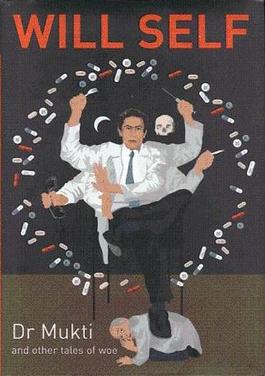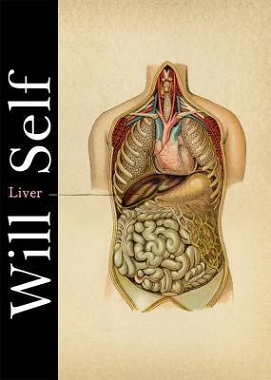
The English Patient is a 1992 novel by Michael Ondaatje. The book follows four dissimilar people brought together at an Italian villa during the Italian Campaign of the Second World War. The four main characters are: an unrecognisably burned man — the eponymous patient, presumed to be English; his Canadian Army nurse; a Sikh British Army sapper; and a Canadian who describes himself as a thief. The story occurs during the North African Campaign and centres on the incremental revelations of the patient's actions prior to his injuries, and the emotional effects of these revelations on the other characters. The story is told by multiple characters and "authors" of books the characters are reading.

William Woodard Self is an English writer, journalist, political commentator and broadcaster. He has written 11 novels, five collections of shorter fiction, three novellas and nine collections of non-fiction writing. Self is currently Professor of Modern Thought at Brunel University London, where he teaches psychogeography.

Girl, Interrupted is a best-selling 1993 memoir by American author Susanna Kaysen, relating her experiences as a young woman in an American psychiatric hospital in the 1960s after being diagnosed with borderline personality disorder.

The Bell Jar is the only novel written by the American writer and poet Sylvia Plath. Originally published under the pseudonym "Victoria Lucas" in 1963, the novel is semi-autobiographical with the names of places and people changed. The book is often regarded as a roman à clef because the protagonist's descent into mental illness parallels Plath's experiences with what may have been clinical depression or bipolar II disorder. Plath died by suicide a month after its first United Kingdom publication. The novel was published under Plath's name for the first time in 1967 and was not published in the United States until 1971, in accordance with the wishes of both Plath's husband Ted Hughes and her mother. The novel has been translated into nearly a dozen languages.
Ohio Impromptu is a "playlet" by Samuel Beckett.

"The Celebrated Jumping Frog of Calaveras County" is an 1865 short story by Mark Twain. It was his first great success as a writer and brought him national attention. The story has also been published as "Jim Smiley and His Jumping Frog" and "The Notorious Jumping Frog of Calaveras County". In it, the narrator retells a story he heard from a bartender, Simon Wheeler, at the Angels Hotel in Angels Camp, California, about the gambler Jim Smiley. The narrator describes him: "If he even seen a straddle bug start to go anywheres, he would bet you how long it would take him to get to wherever he going to, and if you took him up, he would foller that straddle bug to Mexico but what he would find out where he was bound for and how long he was on the road."
Person-centered therapy, also known as person-centered psychotherapy, person-centered counseling, client-centered therapy and Rogerian psychotherapy, is a form of psychotherapy developed by psychologist Carl Rogers and colleagues beginning in the 1940s and extending into the 1980s. Person-centered therapy seeks to facilitate a client's actualizing tendency, "an inbuilt proclivity toward growth and fulfillment", via acceptance, therapist congruence (genuineness), and empathic understanding.
Intensive short-term dynamic psychotherapy (ISTDP) is a form of short-term psychotherapy developed through empirical, video-recorded research by Habib Davanloo.
"The Boarding House" is a short story by James Joyce published in his 1914 collection Dubliners.
Projective identification is a term introduced by Melanie Klein and then widely adopted in psychoanalytic psychotherapy. Projective identification may be used as a type of defense, a means of communicating, a primitive form of relationship, or a route to psychological change; used for ridding the self of unwanted parts or for controlling the other's body and mind.
"The Castle of Terror" is a fantasy short story by American writers L. Sprague de Camp and Lin Carter, featuring the fictional sword and sorcery hero Conan the Barbarian created by Robert E. Howard. It was first published by Lancer Books in the paperback collection Conan of Cimmeria (1969), which was reprinted several times, first by Lancer and later by Ace Books through 1993. It has also been published by Sphere Books in the omnibus paperback collection The Conan Chronicles (1989).

Footfalls is a play by Samuel Beckett. It was written in English, between 2 March and December 1975 and was first performed at the Royal Court Theatre as part of the Samuel Beckett Festival, on May 20, 1976 directed by Beckett himself. Billie Whitelaw, for whom the piece had been written, played May whilst Rose Hill voiced the mother.
The Geoffrey Faber Memorial Prize is a British literary prize established in 1963 in tribute to Geoffrey Faber, founder and first Chairman of the publisher Faber & Faber. It recognises a single volume of poetry or fiction by a United Kingdom, Irish or Commonwealth author under 40 years of age on the date of publication, and is in alternating years awarded to poetry and fiction.
Zack Busner is a recurring character in the fiction of British author Will Self, appearing in the short story collections The Quantity Theory of Insanity, Grey Area, Dr. Mukti and Other Tales of Woe, the novels Great Apes, The Book of Dave, and the 2010s novel trilogy Umbrella, Shark and Phone.

Dr. Mukti and Other Tales of Woe is the sixth collection of short stories by Will Self.

Grey Area is the second collection of short stories by the author Will Self.
Kathryn Faughey was a 56-year-old New York City psychologist who was murdered by 39-year-old David Tarloff at her Upper East Side office on the night of February 12, 2008.

Liver: A Fictional Organ with a Surface Anatomy of Four Lobes is the seventh collection of short stories by Will Self. The stories in the collection are all connected to the liver and was described by the author as "...a collection of two novellas and two longer short stories, all on a liverish theme. Each story features different people suffering from different forms of liver damage." Time Out was one of the first publications to review it and said...
"This inspired collection of four stories uses the liver as framework and controlling metaphor – there’s a tale for each lobe – but is less interested in the organ as a metabolic regulator than in what happens when it’s damaged beyond repair. At this point, Self’s gift for (ahem) bilious satire kicks in, its target largely the ‘slapstick of addiction’ – for which the reformed junky has witheringly little time...Self has all the fun you’d expect with this, and the result is satire so vicious it makes Charlie Brooker look restrained."

Sugar Daddies is a 2003 play by British playwright Alan Ayckbourn. It is about a student who forms a friendship with a rich man over three times her age, who has a sinister past, and maybe a sinister present too.

Umbrella is the ninth novel by Will Self, published in 2012.











